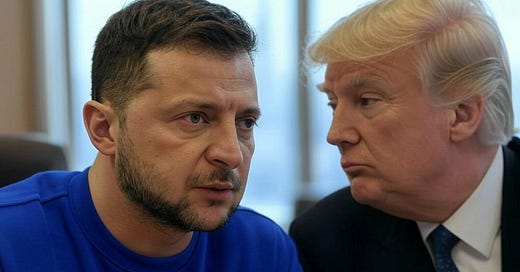Trump and the War in Ukraine: What Is Really Happening?
Donald Trump is playing his game, using his signature hard-nosed negotiation style—constantly shifting rhetoric and raising the stakes—to make everyone panic and act rashly.
The Promise of a "Quick and Final" Victory
Trump has repeatedly stated that if he were to return to the White House, he would "end the war in Ukraine in no time." Some claim he promised to do it within 24 hours; others suggest it would take the first few months of his presidency.
Threats of Sanctions and Cutting Off Aid
Publicly, Trump has hinted that he could halt U.S. support for Ukraine if Kyiv refuses to negotiate. At times, he has made the opposite threat toward Moscow—tightening sanctions if the Kremlin refuses to come to the table. However, the core message has always been the same: both sides must negotiate under American terms.
"I Understand Putin"
Trump has openly stated that he "understands" the Russian leader’s perspective, even calling him "smart" and "cunning." At the same time, he has blamed Ukraine for being "too unyielding." His overall rhetoric boils down to the idea that "both sides are at fault, but Europe should bear the main responsibility."
What is missing from this narrative is the recognition that aggression and territorial occupation are neither diplomatic moves nor justifiable actions. By refusing to acknowledge this, Trump implicitly legitimizes the war waged by the Kremlin.
The "Deal": Resources in Exchange for Peace?
Among Trump’s vague, often implied ideas is a scenario where Ukraine would receive "guarantees" of protection in exchange for giving up territories or making major concessions to Russia. How is this different from accepting the original ultimatum issued by the Kremlin?
Moreover, history has already demonstrated the worth of such "guarantees." Ukraine was given security assurances under the Budapest Memorandum, yet when the time came, no one enforced its provisions.
Secret Negotiations Behind Closed Doors
Trump has repeatedly promised to "personally negotiate" with Putin. Sometimes his rhetoric suggests these negotiations would be backroom deals, conducted in a fast and secretive manner. However, no clear plan has ever been articulated—only vague boasts about his "unmatched ability to strike deals."
So What’s the Big Picture?
Will the “Deal” Be Postponed or Canceled?
Judging by recent developments, it is unclear whether Trump is serious about pressuring both sides into peace, given that one of them (Russia) refuses to recognize Ukraine's very existence as an independent nation.
A Second Summit with Renewed Capitulation Demands?
Moscow may once again push its maximalist demands, potentially leading to a deadlock. If Trump insists on his "deal of the century," he could end up in a situation where he must either compromise his image as a "strong leader" or backtrack on his promises of a quick resolution.
A Strategy of Raising the Stakes?
There is a theory that Trump deliberately sends mixed signals to increase interest in his mediation efforts, particularly from Europe. Either Europe will be forced to take charge of the process itself, or it will have to accept whatever "deal" Trump offers.
Handing the Conflict Over to Europe?
Under this logic, once all parties rush to get involved in the negotiation process, Trump could step aside at the last moment—shifting responsibility onto European allies while portraying himself as "the only one who could have solved it, but was hindered."
Final Conclusion
Trump is playing his game, sticking to his usual tough-guy approach—constantly shifting his rhetoric and raising the stakes to keep the world focused on him and reacting to his every move.
For Ukraine, this means the risk of becoming a bargaining chip in a deal made between external powers.
For Europe, this is a warning sign that Trump may abandon support for Ukraine at any moment, leaving it vulnerable to Putin.
Overall, an analysis of Trump’s rhetoric suggests that he is not truly offering a real peace deal, but rather using the war in Ukraine to strengthen his own political standing—both domestically and internationally. His contradictory statements and backroom "negotiations" are all part of a strategy where the ultimate goal is not a just and lasting peace but his own short-term political gain.



